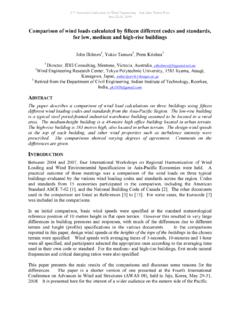Transcription of Stair construction for Class 1 buildings (Nat)
1 Stair construction for Class 1 buildings (Nat) The building code of australia (BCA) Volume 2 - Housing Provision sets out requirements for Stair construction in for Class 1a and 1b residential buildings . There are no Australian Standards for residential Stair construction . All stairs must comply with the BCA performance requirements and this can be achieved by building a Stair in accordance with the deemed-to-satisfy requirements set out below: Each flight must have no more than 18 or less than 2 risers. A flight of stairs is defined as a constant series of risers including winders that is not interrupted by a landing. A single riser creating a change of level does not fit the definition of flight . A maximum of 3 winders in lieu of a quarter landing and 6 winders in lieu of half landings. The length of a flight is limited to restrict the distance a person could fall down the Stair .
2 Quarter landings are considered sufficient to halt a person s fall and are not part of a flight. Winders will not halt a person s fall and therefore are counted as part of a flight. Dimensions of goings and risers must be constant throughout each flight (the BCA does not provide tolerances for the prescribed minimum/maximum dimensions). The riser and going dimensions for each flight of conventional stairs are as shown in Table 1. The actual dimensions must not exceed the minimum and maximum for each of the R, G and 2R+G. Table1 (extract from BCA 2007 Vol 2) RISER AND GOING DIMENSION (mm) for Private stairways Riser (R) Going (G) Slope relationship (2R+G) Types Max Min Max Min Max Min Conventional Stairs 190 115 355 240 700 550 Note: BCA Vol 1 has a minimum going of 250mm for public stairways.
3 125 mm sphere must not pass through a riser opening. Treads must have a slip-resistance finish, or non-skid strip or treatment near the edge of the nosing. Any landing must have a minimum length of 750 mm which is measured 500 mm from the inside edge where it changes direction as shown in Figure 1. The landing may have a gradient but must be no steeper than 1:50 ratio. Figure 1 (extract from BCA 2007 Vol 2) LANDINGS Page 2 Where a doorway opens onto a Stair and the change in level is greater than 570mm (3risers of 190mm each) a landing not less than 750mm long must be provided as shown in Figure 2. Figure 2 (extract from BCA 2007 Vol 2) THRESHOLD LANDING The above requirements are for conventional Stair flights and the BCA should be consulted for dimension and construction for spiral stairs and tapered treads.
4 To learn more about the BCA, you can attend one of the regular BCA Training courses offered by the HIA in your region. For Further Information: HIA members can contact HIA building Services staff on 1300 650 620 or email for more information. Ref No. NAT BCA 07-10 The above is intended to provide general information in summary form. The contents do not constitute specific advice and should not be relied upon as such. Formal specific advice should be sought by members with respect to particular matters before taking action. ABN 99 004 631 752




